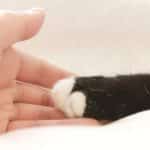Bereavement
It is an unfortunate reality that the life-spans of our pets are much shorter than our own. It is inevitable for all pet owners that at some stage they will have to face the death of a much-loved companion.
Grief over the loss of a pet has some particular features which can make it even more emotionally challenging than the death of a friend or relative. If you burst into tears at work because you have just lost your mother, your workmates are likely to rally around in a very caring and supportive way. If the same thing happens because you have just had to put your beloved 15 year old Labrador to sleep, you’ll be much less likely to receive a sympathetic hearing.
The grief experienced over the loss of a pet is often made worse by the fact that you are likely to have been actively involved in the decision of letting them go. Occasionally a pet will die unexpectedly, but far more often it is the case that we need to make the decision to have our cat or dog put to sleep for humane reasons.
The responsibility of this decision can weigh heavily on your heart.
We often hear people say that they are more upset at the death of a pet than they were when they lost a person who was close to them. There can be many reasons for this. The simple fact is that you are very unlikely to receive from anyone other than a pet the unquestioning love they provide. They don’t hold it against us when we’re tired or sick or just having a bad day – they seem to think we’re perfect, no matter what mistakes we make through life. They carry with them no emotional baggage, no memories of some unresolved grievance or misunderstanding from Aunt Maude’s birthday party twenty years ago. The fact that our animal friends are so entirely dependent on us for their health and well-being also leads to very intense emotional ties. And it’s impossible to overestimate the importance of the companionship of pets in the lives of elderly or socially isolated people, and we all have days when we feel the need of a wagging tail or a feline smooch, even in the midst of what from the outside may appear to be happy, well-adjusted lives.
Grief over the loss of a pet may be inevitable, but there are some strategies you can use to help make the process a little easier.
First, it’s important to realise how fortunate we are to have the option of euthanasia for our pets. In cases where an animal is in pain or feeling very ill, when we know that no matter what we do he will feel worse tomorrow than he does today, it is truly a blessing to be able to save him from going through unnecessary suffering. What an enormous gift to be able to give to a companion who has devoted his entire life to you.
 If you choose to do so, you can stay with your dog or cat while he is being put to sleep. In cases where owners prefer not to be present, we administer the injection immediately after they leave so that the animal is not in a strange environment for any period of time. All of our staff are caring, compassionate people, and no animal has their final needle without pats, cuddles and comforting words.
If you choose to do so, you can stay with your dog or cat while he is being put to sleep. In cases where owners prefer not to be present, we administer the injection immediately after they leave so that the animal is not in a strange environment for any period of time. All of our staff are caring, compassionate people, and no animal has their final needle without pats, cuddles and comforting words.
For owners who do wish to be present, it’s important to be prepared for what is involved in the process of putting a pet to sleep. What normally happens is that an injection is given into the vein of the front leg of a drug which is essentially an anaesthetic overdose. So your pet just falls asleep painlessly, and after she’s asleep the overdose stops her heart from beating. Sometimes after the animal has passed away the body may undergo automatic reflexes, such as passing urine or faeces, or appearing to take a deep breath. It is important to be prepared for events such as this so that they do not come as a shock. The vet will discuss with you before the injection is given the things that may happen.
After your pet has passed away, we will normally leave you alone with him for some time so that you can say a final private goodbye. We encourage owners to stay with their pet as long as they feel necessary. This is an important part of the grieving process for you, and you should never be concerned that you’re taking up our time or getting in the way. This is one of the most important times in your relationship with your dog or cat, and it takes priority.
In cases where a decision to put your pet to sleep has been made in advance, it’s a good idea to give some consideration to what you would like to have happen afterwards.
In the case of small animals, burial at home may be an option. Alternatively, we have access to companies which provide individual pet cremation services. Ashes can be returned to you in a scattering box, or if you would like to keep the ashes, in a wooden box with a brass plaque with your pet’s name on it, or a in ceramic urn.
Some owners may elect not to have an individual cremation, but may like to keep some of their pet’s hair, a collar, or a special toy. For some people, photographs and memories are all they need. If you have time to do so, it’s a good idea to put some thought into this beforehand, because when the time comes you’re likely to be too upset to want to think about these things.
 The difficulty of putting a pet to sleep can be magnified when there are children in the family. It is generally recognised by psychologists that for children over the age of seven it is best to discuss the facts openly and honestly with them. Younger children are usually less traumatised by the loss, and tend to move on to new things – and perhaps even a new pet – relatively quickly. Children differ of course, and if you’re in any doubt about how to handle the situation please get in touch with us and one of our vets will discuss it with you. Children do seem to benefit, though, from some sort of formal recognition of their pet’s passing – perhaps a memorial ceremony where they bury one of the pet’s toys in the garden, or sitting down with their parents and writing out their favourite memories of their pet, or being involved in framing a favourite photograph.
The difficulty of putting a pet to sleep can be magnified when there are children in the family. It is generally recognised by psychologists that for children over the age of seven it is best to discuss the facts openly and honestly with them. Younger children are usually less traumatised by the loss, and tend to move on to new things – and perhaps even a new pet – relatively quickly. Children differ of course, and if you’re in any doubt about how to handle the situation please get in touch with us and one of our vets will discuss it with you. Children do seem to benefit, though, from some sort of formal recognition of their pet’s passing – perhaps a memorial ceremony where they bury one of the pet’s toys in the garden, or sitting down with their parents and writing out their favourite memories of their pet, or being involved in framing a favourite photograph.
It’s important to realise that people go through the same stages of grief with the loss of a pet as they do with any other family member. Don’t bottle up your feelings, but find a sympathetic ear to listen to you. Perhaps 90% of your workmates won’t understand, but there’s bound to be someone who does.
Formal grief counseling is a definite option for some people. And don’t forget that if you can’t find a like-minded person at work or across the back fence, the GVH staff are all animal owners and have all been through the death of pets themselves. We understand what you’re going through, and we’re always available to you if you need to talk things through.
And finally, a quick word on behalf of ourselves. It would be foolish to think that having to be frequently involved in the euthanasia of animals does not take an emotional toll on our staff. It is without doubt one of the most challenging aspects of the work we do. For the sake of the owners, we try as much as possible to maintain a professional demeanour when we’re involved in putting an animal to sleep, but inevitably sometimes it just gets us down. So we hope you’ll understand if sometimes we’re a little less than bubbly- sometimes we’re doing our best to keep up a cheery smile under trying circumstances.
By the same token, it’s a great privilege for us to be able to offer our animal friends- often dogs and cats that we have known since they were puppies and kittens- a pain-free and dignified end to their lives; it can be a very rewarding aspect of the work we do.
The passing of our friends is never an easy thing, nor is it easy to talk about it in the way we’re doing here. There are, however, ways in which we can make it easier for all involved. If the time is approaching when you may have to face this decision, we encourage you to contact one of our vets with any queries you may have. We should never lose sight of the fact that no matter how difficult it may be for us at the end of our companions’ lives, nothing else comes close to the joy they give us, and the wonderful memories they leave with us at their passing.








